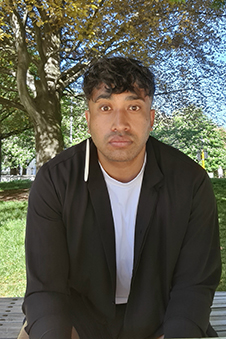New research from the University of Otago, Christchurch, suggests treatment methods for Māori with eating disorders should be specifically tailored and targeted, due to multiple underlying causal factors.
The study, believed to be the first to investigate the perceived causal factors of eating disorders in Māori, recommends healthcare practitioners adopt a more culturally informed psychological assessment model when treating Māori, due to their differing underlying causes of illness.

Mau te Rangimarie Clark (Tainui/Ngati Pikiao/Ngati Kahungungu)
Co-author Mau te Rangimarie Clark (Tainui/Ngati Pikiao/Ngati Kahungungu) says the study, which interviewed Māori aged 16 years or older with a lifetime diagnosis or self-identification of anorexia, bulimia or binge eating disorder, identified the need for an individualised treatment response to promote recovery.
“The diversity of bird calls reminds us of the individuality of eating disorders,” says Clark.
“We’d like to remind healthcare practitioners that just as the Tūī, Kākā and Kererū possess their own bird calls, so do Māori with eating disorders and their whānau, who each have their own experiences, needs and required treatment responses.”
Clark, an assistant research fellow in the campuses department of Māori and Indigenous Health Innovation, says this study builds on Māori eating disorder research released last year, which identified clinician bias (due to outdated stereotypes), idiosyncratic use of eating disorder assessment methods, and the location of treatment services as barriers to diagnoses and treatment for Māori.
“This study digs deeper, looking at our study participants’ explanations of, firstly, what contributed to their eating disorder, secondly, their experiences of their treatment, and finally, what actually helped their recovery.
“Many participants pinpointed socio-cultural factors as causes for their eating disorders, such as Western body ideals of thinness, with one participant identifying the societal pressure she says she felt as a teenager for reinforcing the notion to her that whiteness and ‘pakeha looks’ were superior, leading to a heightened insecurity of her body image,” Clark says.
“Other eating disorder causes our participants relayed were linked to adverse life events such as death, a relationship breakup, change of schooling, abuse, and family dynamics, which impacted development and led to a sense of loneliness, insecurity and worthlessness, making them more vulnerable to the later development of an eating disorder.”
Poverty was also identified as an eating disorder driver in this study, with limited access to food resulting in food-compensatory behaviours such as binge eating.
With regards to their treatment, participants described difficulty in getting appropriate care in more generalised rural settings, with Māori cultural support reliant on the discretion of the healthcare practitioner treating them. Participants who did receive cultural support recounted interactions ranging from 5 minutes to three sessions.
“One participant said their hospital told her that because they didn’t see many Māori patients, they didn’t know what they had to do to support her culturally,” Clark says.
Many participants said the economic burden of treatment also causes stress, due to the expense of private treatment and the financial burden of having to take time off work to attend treatment sessions.
Having access to appropriate health information was reported as being vital for recovery, including learning about emotional self-regulation, improving inter-personal relationships and getting help with information about nutrition and exercise.
“Māori culture, including whānau aspirations, were seen as motivating factors for recovery, with a sense of connectedness to Māori culture credited with improving well-being,” says Clark.
“Others said that self-determination was also vital for recovery, along with a desire to change and take ownership of their eating disorder.”
The study authors say earlier studies have already shown that Māori are under-represented in eating disorder treatment settings, that eating disorder rates among Māori are highest for those in low social deprivation, and that Māori are more likely to experience higher psychiatric co-morbidity and self-harm hospitalisation for eating disorders than non-Māori.
They conclude that a strictly ‘biomedical’ approach to treating eating disorders is not meeting the needs of Māori and their whānau.
They recommend healthcare practitioners adopt a more culturally informed psychological assessment model to help identify the appropriate support services needed for Māori with eating disorders.
For more information and interviews, please contact
Mau te Rangimarie Clark
MIHI Assistant Research Fellow
University of Otago, Christchurch
Email mauterangimarie.clark@otago.ac.nz
Lorelei Mason
Communications Advisor
University of Otago, Christchurch
Email lorelei.mason@otago.ac.nz
Tel +64 21 555 024